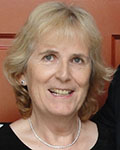2015
S. Elizabeth Bird
- Professor
- University of South Florida

Abstract
In 1968, the world was shocked by harrowing media images of starving children in the African territory known as Biafra, which had tried to secede from Nigeria and was locked in a civil war that ended in 1970 with over a million dead. In this project, anthropologist Elizabeth Bird and historian Fraser Ottanelli work actively with community members in Nigeria to shed new light on a pivotal but neglected atrocity early in the war: the 1967 Asaba massacre, in which hundreds of Nigerian civilians (outside secessionist Biafra) were systematically killed by Nigerian Federal troops. These research and related public dissemination efforts, built on four years of ethnographic interviewing and archival research, will not only rethink the accepted history of the war, but will also contribute to the understanding of long term community trauma and the process of collective memory formation. The project draws on Bird’s expertise in ethnography, media studies, cultural heritage, and applied oral history and Ottanelli’s expertise in historiographic methods, most recently applied to studies of comparative twentieth-century violence and ethnic conflict. The interdisciplinary collaboration in oral history and memory studies requires a grasp of historical scale and an appreciation of the construction of cultural meaning in contemporary memory practices, which is especially fraught in post-conflict situations. The collaboration, which has to date produced several articles and an edited volume, will result in a co-authored book that will: offer a comprehensive historical record of the atrocities; furnish an alternative interpretation to the prevailing understanding of the history of the Nigerian Civil War; illustrate how studying the impact and legacy of events such as this massacre will lead to a deeper understanding of the long “after-life” of traumatic conflicts, especially when suffering is left unrecognized and unresolved; and show how academic/community collaboration in actively “recalibrating” memory offers opportunities to understand Nigeria’s troubled history, perhaps opening possibilities of reconciliation in this ethnically-divided nation. Anthropology and history thus come together in a sustained discussion of memory and the importance of the past in the present. Award period: September 1, 2015 to May 31, 2017

